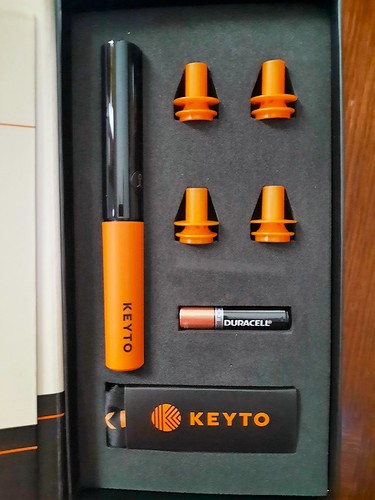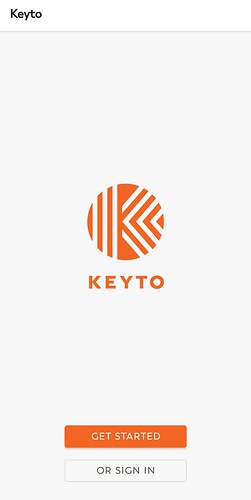I am super excited to be sharing with you today my experience with the Keyto Breathalyzer. I recently got a chance to try it out, keep reading to find out more about it and my thoughts.

Keyto Breathalyzer ~ Product Review
Before I continue I want to let you know that I am not a nutritionist, and I do not advocate the keto diet for everyone. I highly suggest you consult with your doctor before making any changes to your diet. Okay now, let’s continue.
I’ve been living the Keto lifestyle for over two years now. It’s also been two years of testing by using a blood meter. Recently I learned about the Keyto Breathalyzer and I couldn’t wait to give it a try. When you’re following a low carb or Keto lifestyle you want to know that your body is in ketosis. But how convenient is it really to use a blood meter when you’re on the go? I for one never tested my ketones if I wasn’t home or in a hotel room. The Keyto Breathalyzer tests your breath to determine whether or not you are in ketosis. This means that there is no need to prick your fingers, handle bodily fluids, or keep buying boxes of strips. It sounded like a great option, but does it actually work?
Let me start by letting you know what Keyto actually tests for. I’ve already mentioned there’s no handling of bodily fluids, so it’s obviously not checking for ketones in your blood or urine. Instead, Keyto tests your breath for a chemical called acetone. Acetone is produced as your body burns ketones, and much of it is eliminated through your breath when you exhale.

When your body is breaking down ketones leads to acetone levels. The more ketones your body is burning the higher the acetone level will be. The amount of acetone in your breath should be related to your level of ketosis. The Keyto Breathalyzer connects to an app that calculates your approximate level of ketosis based on that acetone reading.
So now you’re probably wondering just how accurate the Keyto Breathalyzer is for measuring ketosis? I’ve been using it for a few weeks and compared the results to what I got with my Keto blood meter. Directly measuring BHB in the blood is obviously the most accurate method, but if the Keyto Breathalyzer results are close then it could be a good alternative way to test for ketosis. Here’s what I found out during my Keyto review:

I have to start by talking about the device. The box comes with the main breathalyzer, four mouthpieces, a battery, and a travel bag. The Keyto itself feels made of high-quality materials. And it’s very easy to self-assemble.

Next, I want to talk about the Keyto app. Installation and registration were easy and I could get up and running with my first Keyto breath check in just a few minutes. The app has a nice look to it, and it’s very user-friendly. The Keyto app calculates your “Keyto Level.” Rather than giving you an actual measure of the amount of acetone in your breath. Keyto uses a scale of 1-8 to track your estimated level of ketosis. Scores of 3 and below are considered to mean you’re not in ketosis. A score of 4 is light ketosis, scores of 5 to 7 are full ketosis, and a score of 8 is deep ketosis.

For the first 3 weeks of using Keyto I wanted to see if the scores correlated with my blood ketone readings. I was amazed to find that the scores were in the range of what I expected. If my blood ketone test gave me a value between 0.6-1mmol/L, my Keyto level was usually a 4 or 5. Higher levels between 1 and 1.5mmol/L scored between 5 and 6. The highest Keyto reading I got during the testing was a 7, with ketone levels of 1.6-1.8mmol/L. I suspect blood readings of 2mmol/L and above would get that coveted 8 Keyto score.
A Keyto test takes just a few minutes from start to finish. Here are the steps so you can see just how easy it is:
1. Open the Keyto app on your phone. Tap to add a new reading.
2. Press the power button on the Keyto device to turn it on and connect (<5 seconds).
3. Wait for the Keyto meter to calibrate (~3 minutes).
4. Exhale into the Keyto meter (10 seconds).
5. Get your results! (5-10 seconds)
The hardest part is the wait for the Keyto Breathalyzer to calibrate. I like to think that it’s taking a reading of the surrounding air so that it has a baseline to compare your breath to. That’s why breathing into the device too early will lower your score. The only tricky part I found is making sure to exhale fully. The app counts you down to get you ready to blow, so it’s not hard to do it correctly. The only thing is to be sure to blow till the end of your breath, where most of the acetone will register.

So what’s my bottom line? After several weeks of using the Keyto Breathalyzer, I am definitely impressed! I also found that it’s also helpful for tracking trends throughout the day to learn how different food, activities, and other factors impact my level of ketosis. Thanks to the Keyto Breathalyzer I am now able to check my level anywhere at any time I want.






Seriously thinking about this. I am just beginning my keto journey, and this would make tracking my progress so much easier.